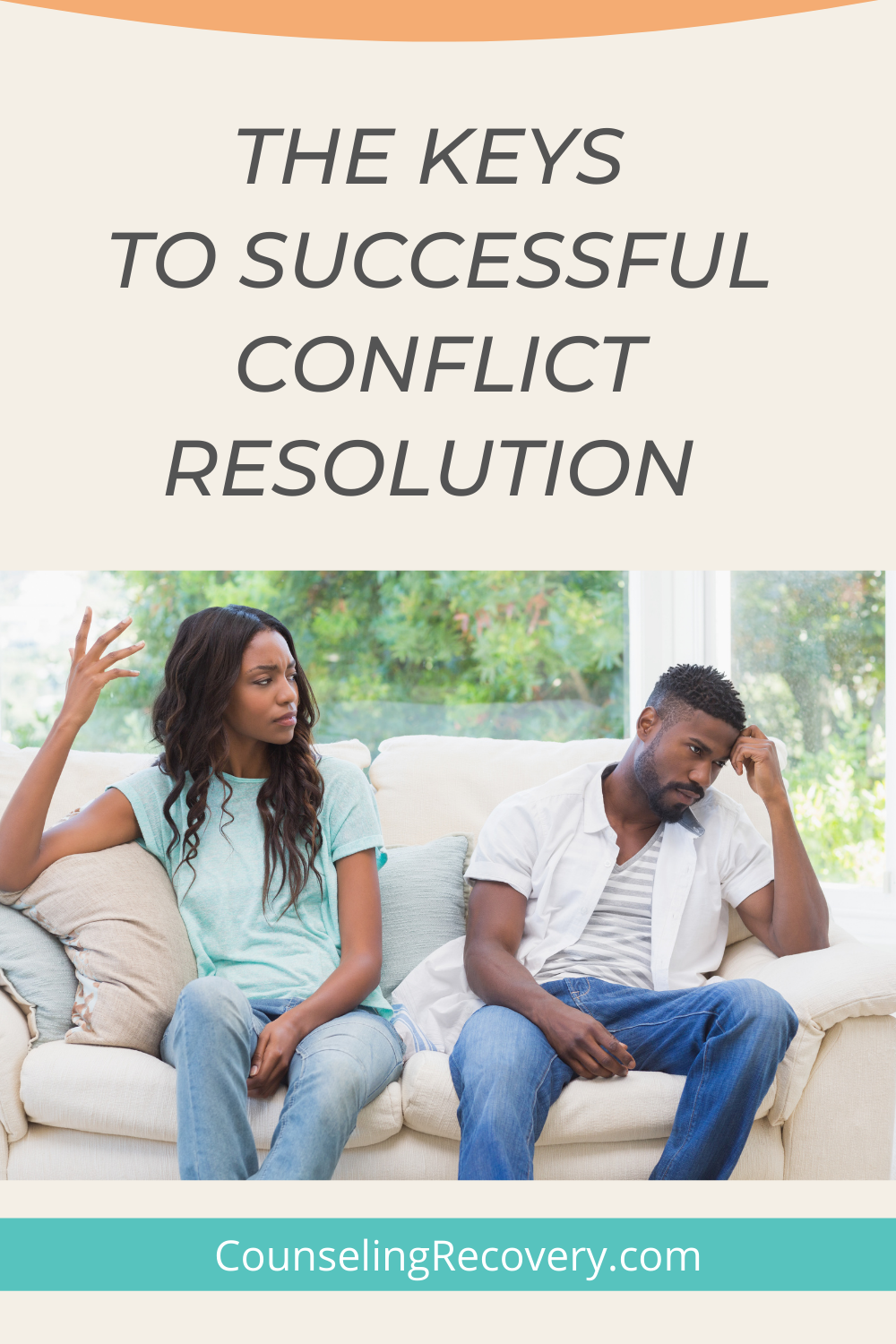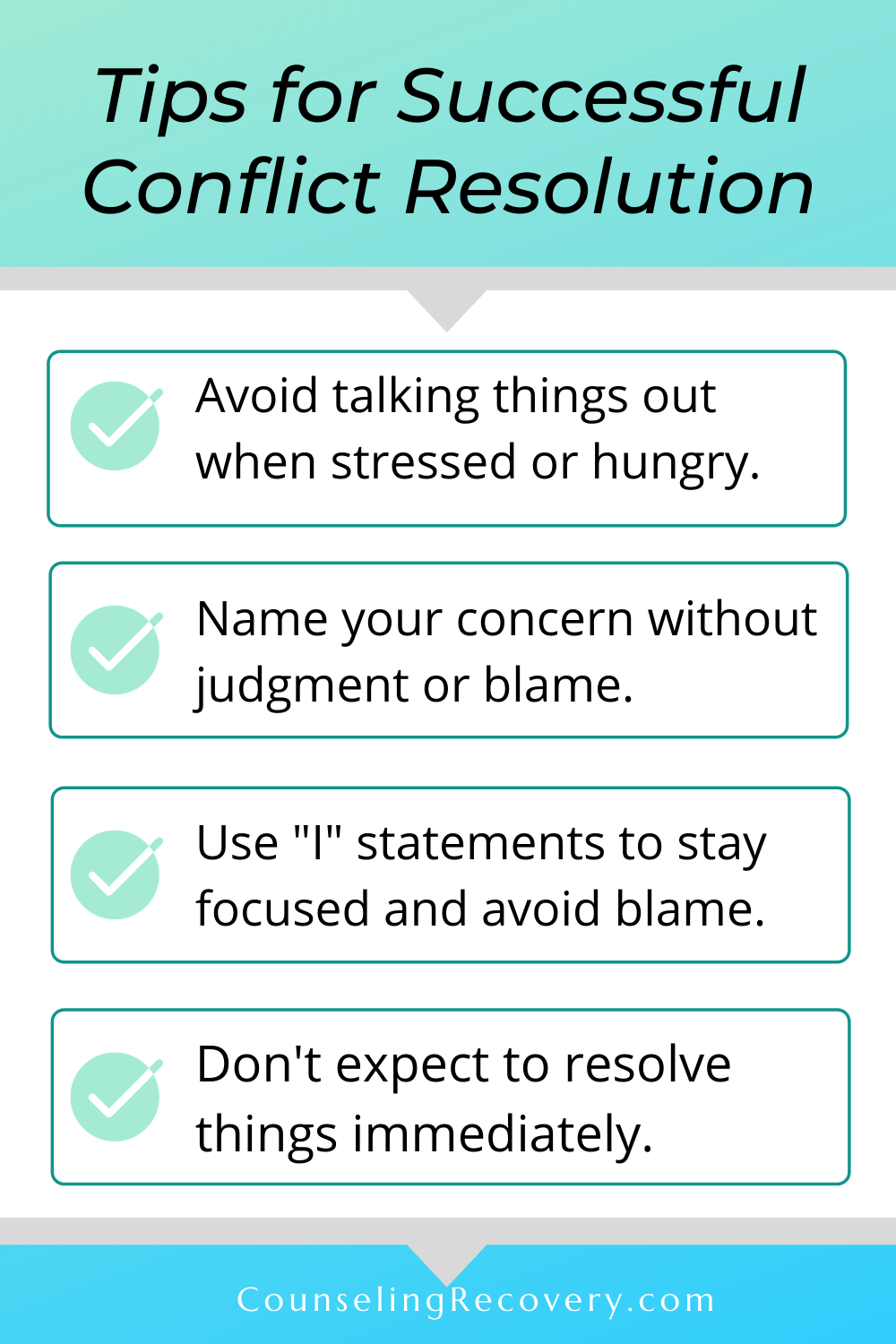The Keys to Successful Conflict Resolution
Nothing insures a relationship more than successful conflict resolution. When conflicts don't get resolved the hurt can go on for years. Eventually the relationship fails not because you didn't work at it - but because you simply couldn't resolve anything.
To be fair, most people are uncomfortable with conflict. A common but misguided belief is hoping that the issue will go away on its own. You think, maybe it's not that bad yet but you find yourself having the same argument again and again.
To Confront or Not to Confront in Conflict Resolution
There are two factors to consider before deciding whether or not to confront an issue directly.
The best practice is to stop a conflict before it escalates. However, if you find yourself in a heated dispute with your partner, there are two factors to consider before deciding whether or not to confront an issue directly.
First, is it safe to talk things out? Whenever there is any history of violence or abuse, bringing up problems becomes potentially dangerous. You may need some professional help to figure things out.
Second, are you in the right place emotionally to discuss things? When you're tired, stressed or even hungry, it's time to wait. If all you want to do is retaliate, don't do anything. Walk away, believe me you’ll thank me later!
When it’s safe and you are in the right mindset to talk, here are my best tips for successful conflict resolution.
Helpful Tips for Successful Conflict Resolution
1. Identify Difficult Feelings First.
Conflict can bring out intense emotions like fear, anger, even panic. Wanting to be right and getting defensive create a win/lose mentality that makes resolution next to impossible.
Identifying these feelings early will help you decide what to do next and are the key in successful conflict resolution. A good rule of thumb is that if you're too upset to listen, you shouldn't be talking. Emotions are probably too high to have a productive conversation.
Instead, find healthy ways to stay calm. Using substances to take the edge off doesn’t work even though it may seem like a quick fix. This usually creates more problems in the long run.
2. Pick a Time When You’re Not Tired or Stressed.
Also, there is no hard and fast rule that says you have to respond immediately. If you’re not up to talking, let them know. Picking a mutually beneficial time can go a long way to avoiding hurtful arguments.
Some healthy outlets include; taking a walk, journal writing, calling a friend, meditating, to name a few.
Your emotions will influence the outcome more than you think. Being in the right frame of mind will help you to communicate more effectively.
3. Writing a Script Promotes Successful Conflict Resolution
Planning ahead for a potentially difficult conversation improves the outcome. When you jump into an argument without thinking, the tendency to get defensive will likely increase.
Writing out what needs to be said helps you stick to the point. It also provides clarity on what’s significant versus getting lost in the emotion. A script enables you to avoid bringing up outside issues that tend to escalate things and can result in a more successful conflict resolution.
Tips for Creating a Conflict Resolution:
Avoid talking things out when stressed or hungry.
Name your concern in a neutral way, without blame or judgment.
Use “I statements” to keep the focus on you.
Lower your expectations from winning the argument to being heard.
Example: "I'm really upset that you talked with mom behind my back. I need you to talk to me directly."
You may need to have more than one conversation to talk things out completely.
4. Using “I” Statements to Avoid Blame.
Telling someone they’re “making you upset” isn’t helpful and provokes a defensive reaction.
Remember, everyone reacts differently depending on their mindset and family history. Take responsibility for your feelings because focusing on what they did to you will make it difficult to stay calm.
Example of an “I” statement: "I feel hurt when you don't respond to my texts."
Example of a “You” message: "You're making me so mad."
According to The Gottman Institute, the first 3 minutes of a conversation predicts the outcome. Starting off with an "I” statement keeps the conversation less defensive.
5. Seek Understanding before a Resolution.
Don’t assume that all conflicts should be resolved immediately. Sometimes it takes several conversations before reaching a conclusion and that’s okay. Having unrealistic exceptions can be a set for frustration.
Most people focus on achieving resolution but the first step in healthy communication is understanding each other. Listening is an essential part of that.
A simple yet powerful listening skill is to summarize what's being said and ask if you’ve heard it correctly. This takes time but it works. Assuming that you’re correct isn’t the same as getting it right. Resolving conflict starts when listening becomes as important as sharing.
By taking the time to listen and understand the other person, you will feel more empathetic towards them. You’re motivated to compromise rather than getting your way.
6. Use Time-outs to Avoid Losing Your Temper.
Knowing when to leave an argument keeps everyone safe. It’s easier to take a break and prevent hurting each other. When you understand your dance of anger, you'll know when to leave.
It helps to recognize the most common signs of anger. These include muscle tension, rapid heart rate, irritability, clenched teeth, shallow breathing, sweating, raised voices and negative thinking. Use these signs to stop and take a break.
To ensure a healthy use of time-outs here're some suggestions.
Healthy time-outs include:
Picking a safe place to go to calm down
Sharing your time-out plan with your partner
Negotiating a time to talk after returning
Talking only when both people are ready
Time-outs fail when you:
Leave without letting your partner know
Refuse to set a time to continue the discussion
Don't leave the house so the fight starts up again
Make unhealthy choices like driving, or using substances during the time-out
7. Resume Discussions When You’re Both Ready
Making the effort to continue the conversation after a break shows that you care. Don’t make the mistake of thinking things will blow over.
Check in with the other person. See where they are in terms of what happened. Sometimes taking a break brings a new perspective that can deepen understanding.
Final Thoughts on Conflict Resolution
Successful conflict resolution requires prep work. Diving into a conversation impulsively doesn't usually end well. You say things you don't mean and hurt each other in the process. Taking the time to think about wha to say keeps the focus on what's important.
Your goals should focus on expressing yourself without blame and understanding each other's point of view. It takes effort, but when you stay calm and know what to say, you're setting a powerful example for your partner to follow. Successful conflict resolution takes time, but in pieces, you'll be more successful in the long run.



